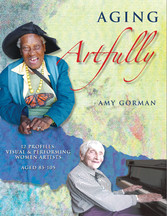
Aging Artfully - 12 Profiles: Visual and Performing Women Artists 85-105
von: Amy Gorman
BookBaby, 2014
ISBN: 9781483539690
Sprache: Englisch
144 Seiten, Download: 7582 KB
Format: EPUB, auch als Online-Lesen
Prelude: About four weeks before Lily’s death at age 107, I am sitting in the North Berkeley Senior Center listening to her warm up with Bach’s Invention #8, and then I hear her play Chopin’s Fantasie Impromptuand Mozart’s Turkish March. Her arm strength is amazing. The Mozart requires big muscles for its octave passages, and Lily applies her great determination to hit most of the notes.
On January 19, 2005 Lily died of natural causes in her sleep in her own home. She had suffered from fatigue for about three weeks prior to her gentle passing. I feel honored to have known her and to have been there to say my farewells within days of her death.
Lily’s life spanned three centuries. I first interviewed her on her 105th birthday, May 31, 2002, then several more times over the next two-plus years. Based on our many conversations, this is what I wrote about Lily in 2004.
Lily never drank coffee. But she does adore a small glass of cherry heering, “a shlup,” before she goes to bed. She never smoked. She practices on her cherished Schiedmayer grand piano daily, from 8-9 a.m., always beginning with scales and chords. Lily has definite ideas about piano practicing, and believes she must practice daily or she will not have a good day. She plays at the North Berkeley Senior Center just before the noon lunch, as she has every weekday for thirty years. “I practice scales and chords every day so I don’t forget them. They are precious to me. Everything goes but the piano – the piano doesn’t go away. That is forever,” she says.
She proudly wears neither hearing aid nor glasses. She now walks with a cane, but at a pace hard to keep up with. About five feet, a striking petite figure of a woman, Lily’s fine sculptured bones carry not a spare ounce of flesh. She is spectacular as she lifts her leg effortlessly, like a dancer, when I remark on her limber moves.
Her small bony frame gives no indication of the robust, muscular woman of her early family photos. She was an ardent mountaineer and skier for years. And only when about to turn 105 did Lily give up her daily swim at the Berkeley City Club, a venerable Julia Morgan-designed building. She cited her growing fatigue, a feeling that she was sinking, and the coldness of the water.
Lily is piercing in her attentiveness, and she expresses herself with the presence and precision of someone half her age, clearly and with a keen intelligence. Her memory seems remarkably intact. She is stunning in her command of language, English being her third. Her speech reflects the cultured refinement of her Viennese heritage; her voice is strong and emphatic, heavy with an Austrian accent. Lily’s manner, confident yet insistently modest, gives her an air of old world graciousness and European aristocracy, tempered by the liberal politics of a Jewish immigrant.
She laughs easily and jokes often. After playing the piano for a while, she says smiling, “Have I played enough for you, yet?” But she moves me to tears with stories of her friends and relatives during the Nazi era in Austria in the 1930s. She conveys deep gratitude that she and her family were spared, and she cannot thank the American people enough, especially the Quakers who helped re-settle her. “I never forget that we were so lucky to come here – and the others perished.”
Hirsch family, 1938
She was born Lily Roger in Oswiciem, Austria, what is now Auschwitz, Poland, the third child of a middle class Jewish family. The family moved to Vienna when Lily was a young girl. “My mother was a darling... I never was so good.” Her father, a state employee, was a disciplinarian. Lily became an obedient child, never causing trouble. “Mistakes over there [in Europe] are punishable because everything should be perfect! One learns as a child to obey. No one resisted. It’s much better here [in America].”
Her sister Margaret, five years older, later became the first woman pharmacist in Vienna. The two remained close friends throughout their lifetimes. Her brother Kurt, two years Lily’s senior, “was the creative one, the real rebel. Being artistic he had a rebellious nature, and my mother let him do anything he wanted.” He became a composer, left for England and eventually married Joy, an Irish woman, who remains one of Lily’s dearest friends. Kurt never achieved fame during his lifetime, but his music has been played frequently in Europe, posthumously.
Lily was baptized in a Methodist church as a child, a common custom among assimilated, intellectual Viennese Jews at the time, perhaps to avoid anti-Semitism. Her freethinking family didn’t believe in religious precepts or in perpetuating Judaism. Lily still believes that today, and she welcomes the intermarriage of Jews with non-Jews.
There being no kindergarten, she started school at age six. Her favorite memory of school was the singing, because it was “so good to develop your personality.” She also began her piano studies at six. “It was the trend. Everyone took piano lessons.” At the lyceum (high school), she learned French and English in addition to all the other academic subjects.
In summers, the family frequented the Viennese region’s lakes and rivers where Lily soon learned to swim. After watching her siblings swim, she thought she could too. One day they just threw her in the water. “You jump into the Danube; the rush in the river holds you down under water. If you don’t fight it, the river takes you back up. It was dangerous but we all survived.”1 Later, she would swim across the Danube just for the challenge of it. Today, she feels swimming is the only sport for an older person. She says passionately, “Never give it up! I tell people keep it up... don’t give up!”
During her youth, Lily heard all the great virtuosi in the grand concert halls of Vienna. This began her lifelong love of opera, especially Mozart and Wagner. Remembering Pablo Casals in concert, she says, “Unforgettable! He closed his eyes when he played... the whole concert. I went to all his concerts... naturally, everybody in Vienna went.”
During her adolescent years she and her sister learned to ski and climb mountains. “Everyone in our circle did. We looked down on the ones who didn’t!” They were peoples’ sports, which means you didn’t need much money to do them.
Lily as sportswoman
The sisters, Lily claims, were the first women to ski in Austria. Women skied in Sweden and Norway, but not Austria. They even challenged the prevailing fashions. She and Margaret were the first European women skiers to wear pants instead of skirts. As the trend-setting, independent spirits they were, she says, they would “not ski in skirts like the Norwegians,” and their pants garnered extensive newspaper publicity at the time. Skiing was a beloved sport all her life until, at age 88, a car hit her, breaking both her legs. She recovered fully, but her skiing days were over.
About mountaineering she rhapsodizes, “To be alone in that mountain... you are in another world, in heaven.” She smiles radiantly; her joy is palpable.
Lily climbed mountains during every vacation. All through her twenties she went alone with a guide. “That’s how you did it, or with another girl and a guide. You were with that guide for a week, and they didn’t touch you. It wasn’t like now when you’d be afraid to go and be alone with them.”
She learned to rock climb, using a rope and wearing shoes made of a linen-like material; there was also canoeing, horseback riding, tennis. “Life can be wonderful,” reflects Lily, “when you have your health... many people are afraid. They stay in. I didn’t stay in. I think that’s how I got so old.”
Although her sister and brother went to the University after high school, Lily did not. Her family had limited means, and being of a practical mind she decided to start earning money by working in a bank. She continued to play piano, but “I didn’t want to strive to play professionally because there was too much competition. I wasn’t good enough. I thought I’d be starving all my life.”
In fact she was close to starving during World War I. “I remember well when I was hungry... It hurts a lot when you’re hungry.” She says, “It wasn’t easy to endure. Finally we got some food when the peasants from the country came and sold some of their things in the city.”
Her twenties were marred by one problem only – she wasn’t yet married and, at thirty, she feared she might never meet the right person. Her mountains meant more to her than any man she knew. She says, “I fell in love with the mountains more than with men.”
Finally, she met “the man,” Alphonse Hirsch, a German Jew. They met on a ski train. John Hearst (Lily’s son) says, “Alphonse was a skilled mountaineer and skier, and it was this connection which initially brought them together. Climbing mountains was one of their great joys.”
“He had climbed Mont Blanc!” exclaims Lily. It meant the world to her that he was a strong mountaineer. She adds with a smile, “He liked me very much because I was a better skier than he.” Remembering the Sports Train that took them on long trips through the mountains, she muses, “What better way is there to know who a man really is than to see him when he’s hungry, he’s cold, and he has to sleep on hay? Many marriages were performed on account of the Sports Train.”2 But for Lily and Alphonse the road to matrimony was not so simple. She could make a commitment, but could Alphonse?
Freud was all the rage in Vienna at...










